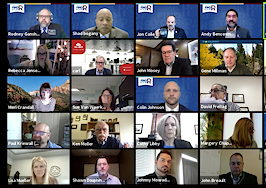The National Association of Realtors approved new standards for its local associations and multiple listing services Friday, including a policy requiring MLSs to process complaints anonymously upon request. The trade group also voted to come up with a process to do social media background checks on members who aspire to NAR elected office.
NAR’s 959-member board of directors, which represents the trade group’s 1.4 million members, also passed controversial changes to its professional standards to crack down on racist and discriminatory speech and behavior. The changes were motivated in part by a desire to protect the Realtor brand.
A social media background check
In that same vein, the board approved a policy that directs NAR’s Credentials and Campaign Rules Committee to establish a process for conducting a social media background check as part of the trade group’s review process for potential candidates for NAR elected office. Such candidates are already subject to a review process that includes a financial audit, legal audit, and criminal background check, according to the committee’s stated rationale for the policy.
“This review process seeks to identify any issues in a candidate’s history that may cause an embarrassment to or shed negative light on NAR if the candidate were to serve as an NAR Officer. With the growing use of social media and the resulting digital footprint, it is prudent to evolve the Potential Candidate review to include a social media audit of a candidate’s online identity,” the committee said.
“The committee will develop the parameters for a social media audit of publicly available information to screen for an individual’s illegal or otherwise concerning behavior that may negatively impact NAR, and include an opportunity for candidates to provide additional information related to any issues revealed through the audit.”
The policy does not allow the committee to create additional required criteria for automatic disqualification of any candidate, the committee added.
MLS standards
NAR’s board of directors also approved MLS policies put forth by the trade group’s Multiple Listing Issues and Policies Committee. The proposals were created by the committee’s MLS Standards Work Group, which was charged with considering the criteria and enforcement process for minimum MLS standards for Realtor-affiliated MLSs, similar to core standards for Realtor associations.
The eight policies are the first phase of a two-phase approach. The second phase will involve gathering industry feedback and developing MLS standards and an enforcement process for spring 2021, according to work group co-chair Jon Coile.
The policy changes mandate that agents and brokers who receive more than three administrative sanctions in a calendar year be required to attend a hearing and mandate that MLSs process complaints anonymously when the complainant requests it.
The rationale of authorizing anonymous complaints of MLS rules is to “eliminate the stigma of bringing questionable actions and business practices of other participants and subscribers to the attention of the MLS,” according to the work group.
Bringing complaints can be a “sensitive issue” for agents who may end up working together on a home sale, according to Chris Carrillo, co-chair of the work group.
“We don’t want to put Realtors in the position where you are going to be in a transaction with a Realtor that maybe you have to send the infraction or send the question in on a listing, perhaps the following week,” he said.
“This just ensures that the MLS can keep that complainant anonymous and that somebody on staff or designee of the MLS can represent this issue, especially if in fact it goes before a hearing.”
The standards also require that MLSs implement a process for identifying potential violations of fair housing laws, that MLSs provide the same data fields under Web API data feeds that they provide under other types of feeds, and that MLSs display customer service and technical support contact information on their websites. MLSs are also now required to mandate that agents and brokers submit accurate listing data and correct any known errors.
The MLS committee shelved a controversial proposal on Wednesday that would have required listings submitted to Realtor-affiliated multiple listing services to include a property address that would be visible to other subscribers, sending it back to its MLS Technology and Emerging Issues Advisory Board.
Association core standards
In addition, NAR’s board of directors approved changes to core standards for local associations brought forth by its Association Executives Committee. Core standards are minimum requirements that state and local associations must comply with annually in order to remain Realtor-affiliated.
The core standards changes would require that association strategic plans include diversity, equity and inclusion and fair housing components and that associations annually certify that they have conducted or promoted a diversity, equity and inclusion (DEI) activity and a fair housing activity.
They would also require that leadership development and training include “a commitment” to greater diversity, equity and inclusion among the association’s volunteer leadership. Lastly, they would require that associations have the ability to interact with members remotely through a virtual meeting platform.
While the core standards did not previously allow one activity to serve more than one requirement, the board approved a change to allow DEI and fair housing activities to fulfill current advocacy or consumer outreach requirements under the core standards in order to make the new mandates less burdensome for associations.
“Our rationale [for the DEI and fair housing activity requirements] is that NAR’s 2021 strategic priorities call for greater DEI among association members and leaders, and a commitment to achieving housing equality and affordability,” Jan Marie Ennenga, vice chair of the committee’s core standards work group, told attendees at the conference’s Association Executives Forum last week.
The board of directors meeting, originally scheduled from 10 a.m. to 12 p.m. Central, ran some two hours over its scheduled time. Inman asked whether debate on particular policy changes prompted the delay, but NAR declined to comment.
All items put before the board passed as presented, according to a spokesperson.







